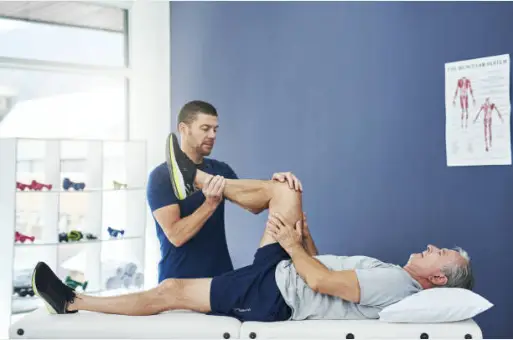Why You Need It and What to Expect
When recovering from an injury, coping with a chronic ailment, or encountering age-related discomfort, you may be directed to consult a physical therapist by your doctor.
A physical therapist specializes in evaluating, diagnosing, and treating various musculoskeletal and neuromuscular issues. They are experts in human movement and function, and their primary goal is to help individuals of all ages regain or improve their physical abilities, reduce pain, and promote overall health and wellness.
Physical therapists use a combination of therapeutic interventions, such as manual therapy, exercise prescription, and patient education, to address a wide range of conditions. These may include, but are not limited to, injuries, post-operative rehabilitation, chronic pain management, neurological disorders, and age-related mobility concerns.
Physical therapists work closely with their patients to develop personalized treatment plans tailored to each individual’s specific needs and goals.While many people seek physical therapy for specific pain or conditions, it isn’t solely focused on problem-solving. It can also be incorporated into a holistic, preventative wellness strategy.
The Importance of Physical Therapy
Physical therapy plays a crucial role in promoting and maintaining overall health and wellness. It is a non-invasive treatment option that targets the root cause of physical discomfort, rather than merely addressing symptoms. Physical therapy can help:
-
- Prevent and treat injuries: By identifying potential weaknesses and addressing them proactively, physical therapists can help patients avoid injuries and recover faster when they do occur.
- Improve mobility and balance: Physical therapy can help individuals regain strength, flexibility, and coordination, allowing them to move more freely and confidently.
- Enhance sports performance: Athletes often rely on physical therapists to help them recover from injuries and optimize their performance through targeted exercises and techniques.
- Manage chronic conditions: Physical therapy can help individuals manage chronic pain, arthritis, and other long-term conditions by improving joint and muscle function.
- Maximize recovery from surgery: Post-operative rehabilitation through physical therapy is essential for a successful recovery and return to daily activities.
What is Physical Therapy
Physical therapy is a branch of rehabilitative medicine that utilizes a variety of therapeutic interventions to help patients regain or improve their physical abilities. These interventions may include:
-
- Manual therapy: This involves hands-on techniques such as joint mobilization, soft tissue massage, and myofascial release to alleviate pain and improve function.
- Exercise prescription: Physical therapists design individualized exercise programs tailored to each patient’s specific needs and goals, emphasizing strength, flexibility, endurance, and balance.
- Modalities: Physical therapists may use a range of tools and equipment, such as ultrasound, electrical stimulation, and heat/cold therapy, to aid in the healing process and manage pain.
- Patient education: Educating patients about their condition and providing strategies for self-care is a critical component of physical therapy, empowering patients to take an active role in their recovery.
How Physical Therapy Helps
Physical therapy can help individuals in various ways, depending on their unique needs and goals:
-
- Pain reduction: Physical therapists use evidence-based techniques to alleviate pain and reduce inflammation, promoting the body’s natural healing process.
- Improved function: By addressing muscle imbalances, joint restrictions, and other biomechanical issues, physical therapy can help patients regain their normal range of motion and strength.
- Enhanced quality of life: As individuals regain their physical abilities, they often experience an improved sense of well-being and a renewed ability to participate in daily activities and hobbies.
- Injury prevention: Physical therapy can identify and address areas of weakness, helping to reduce the risk of future injuries and complications.
Why You Might Need Physical Therapy
There are numerous reasons you may require physical therapy, including:
-
- Injury or surgery recovery: Physical therapy is essential for helping individuals recover from accidents, sports injuries, and surgical procedures.
- Chronic pain management: Physical therapy can provide long-term relief for individuals suffering from chronic pain by addressing the underlying causes and promoting overall health.
- Neurological conditions: Physical therapists often work with patients who have conditions such as stroke, Parkinson’s disease, or multiple sclerosis to improve mobility and functionality.
- Age-related concerns: As we age, our bodies naturally undergo changes that can lead to decreased strength, balance, and flexibility. Physical therapy can help address these issues and promote healthy aging.
- Promote Overall Health and Wellness: Physical therapy not only targets specific concerns but also plays a vital role in maintaining and enhancing overall well-being, helping individuals stay active and healthy throughout their lives.
Conclusion
Physical therapy is a vital aspect of healthcare that offers a comprehensive approach to treating and preventing various physical ailments. By focusing on the root causes of discomfort and pain, physical therapy not only aids in recovery but also promotes overall health and wellness. It can help individuals of all ages and abilities regain their mobility, improve their functionality, and enhance their quality of life. Whether you’re recovering from an injury, managing a chronic condition, or simply looking to maintain your physical health, physical therapy can provide the targeted support and intervention needed to help you achieve your goals. Remember, it’s essential to work closely with a qualified physical therapist to ensure you receive the most appropriate and effective care tailored to your individual needs. In doing so, you’ll be taking an essential step towards a healthier, more active, and fulfilling life.


